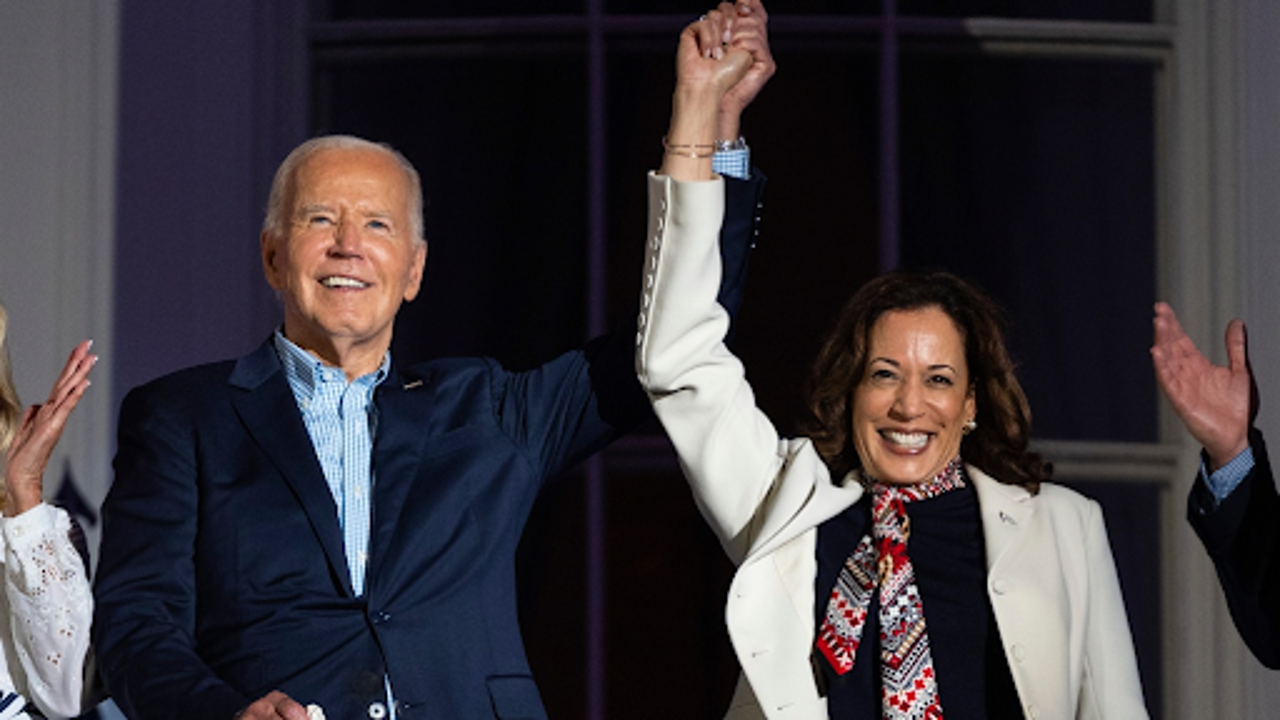
On Thursday, July 4, 2024, President Joe Biden and Vice President Kamala Harris watched the Independence Day fireworks over the National Mall from the White House balcony, with Biden raising Harris's hand in celebration. (AP Photo)
On Sunday, U.S. President Joe Biden announced he was ending his bid for re-election in 2024. This decision came after a tough debate with Donald Trump, which raised concerns about Biden's ability to serve another term, with the election just four months away. Biden's withdrawal marks a significant moment in U.S. political history, as no sitting president has ever stepped down from a re-election campaign so close to the election.
In a swift move, Biden endorsed Vice President Kamala Harris to take his place as the Democratic nominee. He urged his party to rally behind her, making her the front-runner for the nomination at the August convention in Chicago. This development comes at a crucial time, just a week after an attempted assassination of Trump at a Pennsylvania rally.
Harris praised Biden's decision as a "selfless and patriotic act" and expressed her determination to win the nomination. She emphasized her commitment to uniting the Democratic Party and the nation to defeat Trump and his "extreme Project 2025 agenda."
Biden's decision followed a surge of pressure from Democratic allies after his poor performance in the June 27 debate, where he struggled with responses and failed to challenge Trump's falsehoods effectively. In a letter posted on his X account, Biden stated, "It has been the greatest honor of my life to serve as your President. While I intended to seek re-election, I believe it is in the best interest of my party and the country for me to stand down and focus on my duties for the remainder of my term."
On Sunday, July 14, 2024, President Joe Biden spoke from the Roosevelt Room in the White House, with Vice President Kamala Harris listening nearby. (AP Photo)
Shortly after announcing his withdrawal, Biden endorsed Harris on social media, calling for Democrats to unite and defeat Trump. The endorsement from Biden, along with support from the Congressional Black Caucus and former President Bill Clinton and former Secretary of State Hillary Clinton, solidified Harris's position as the leading candidate. However, former President Barack Obama has not yet endorsed Harris, though he praised Biden's decision.
Biden made his decision while isolating at his Delaware beach house due to a recent COVID-19 diagnosis. Senior campaign and White House staff were informed just minutes before the public announcement. Now, the Democratic Party faces the urgent task of coalescing around a new nominee and convincing voters that Harris can take on Trump.
Biden's exit ends a 52-year career in electoral politics. Although he won the vast majority of delegates and every nominating contest but one, the Democratic Party must now navigate a swift transition to a new nominee. Harris, 59, appears to be the natural successor, partly because she can directly access Biden's campaign funds.
Despite Biden's backing, the transition to Harris's nomination is not guaranteed to be smooth. The Democratic National Convention, scheduled for August 19-22 in Chicago, may face challenges as the party works to unite behind Harris. The Democratic National Committee has pledged a transparent process to select a nominee capable of defeating Trump.
Trump reacted to Biden's withdrawal on his Truth Social site, claiming Biden was unfit for the presidency and promising to quickly remedy the damage he believes Biden has done. Despite preferring to face Biden, Trump's campaign has already begun attacking Harris.
Democratic leaders, including Senate Majority Leader Chuck Schumer and House Democratic leader Hakeem Jeffries, praised Biden's decision. Schumer called Biden a "true patriot and great American," while Jeffries lauded him as "one of the most accomplished and consequential leaders in American history." However, Republican House Speaker Mike Johnson criticized Biden, suggesting he should resign immediately if unfit to run for office.
Biden plans to address the nation later this week to explain his decision further. Despite stepping down from the race, he intends to continue fulfilling his presidential duties, including hosting Israeli Prime Minister Benjamin Netanyahu at the White House.
In 2020, Biden positioned himself as a bridge to a new generation of leaders. Although he initially resisted stepping down, his poor debate performance and concerns about his age ultimately led to his decision. Despite Biden's efforts to reassure voters of his capability, public and donor concerns about his ability to serve another term persisted.
Biden's motivation for running was deeply connected to Trump, whose comments following the 2017 "Unite the Right" rally in Charlottesville, Virginia, prompted Biden to enter the 2020 race. As Biden steps aside, his wife, Jill Biden, and granddaughter, Naomi Biden Neal, expressed pride in his service and accomplishments.















